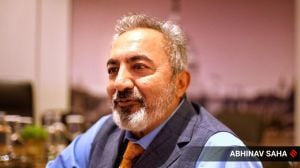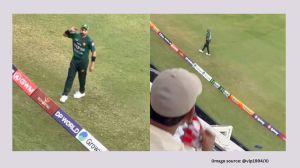Hero: Dhanraj Pillay
THEY say that Dhanraj Pillay’s magic is timeless and he can pierce through any defence on his own like a champion sprinter, carrying on...

THEY say that Dhanraj Pillay’s magic is timeless and he can pierce through any defence on his own like a champion sprinter, carrying on even when his lungs are bursting. He’s fought issues off the field with the same zeal and, in his 12-year international career, has often had to pay the price for standing up to authority on what he feels are basic principles.
For the past decade, the images of Indian hockey have been inextricably linked with this colourful, charismatic individual. His fans still remember how he cried unconsolably, squatting at the foot of the Indian goalpost after the team narrowly lost a place in the semifinals at the Sydney Olympics. Or how, after playing out of his skin against Pakistan a few days ago, knelt down on the turf and said a silent thanks.
His fans aren’t merely from his native Pune; nor even from India. They exist in Pakistan, in Germany, every hockey-loving nation, where he personifies Indian hockey. On the subcontinent, he holds out hope for the survival of the traditional game.
But, as in all Indian sport, it’s a short walk from hero to zero. If Bangkok, 1998 — when India won the Asian games gold — remains his proudest moment, the most painful followed soon after. When the team returned to Delhi, they found no senior official from the IHF to receive them. It was late at night and their connecting flight to Mumbai was in the morning; they sat out the night at the airport, gold medals and all.
Once in Mumbai, six senior members of the team — led by Dhanraj and goalkeeper Ashish Ballal, and coach Kowshik — came out strongly against the treatment they’d received. They were summarily dropped from the next tournament India played; no explanation was initially offered; later, it was officially said that they were ‘‘rested’’.
It’s been a long rest for Ballal — he never played for India again. Dhanraj eventually re-surfaced, but the scars took a long time to heal. He still refuses to admit that they were wrong in criticising the federation, and there will be few neutrals who do not feel some sympathy for them.
That wasn’t, of course, his only brush with controversy. Just before the breakthrough tour to Pakistan, the same year, Dhanraj raised the banner of revolt of the team’s low stipend. The entire Indian team backed him, refusing to go on tour till the demand was met. Eventually, the federation persuaded them, with the promise of a future settlement. Indian players still get $20 a day on overseas tours, where the Pakistanis get $50.
Today, Dhanraj has no regrets over his postrure. ‘‘The tag of a rebel came to me because I went against the federation to fight for the benefit of the players. Even Mr Gill (IHF president KPS Gill) appreciated my concern for players.’’
But recalling those moments of struggle gets him all emotional. He remembers all those who helped him. ‘‘My brother Ramesh and Joaquim Carvalho (former Indian Olympian) were like gods to me. Carvalho helped me get a job and Balasaheb Thackeray got me a house in Mumbai after the Asian Games victory. I can never forget their kindness.’’
If Pillay’s career has been marked by a constant struggle against the odds, the signs were evident early on in his life. Born to a family not so well-off, he grew up the hard way in the gallis around the neighbourhood armaments factory in Pune. Growing up as one of five siblings, Dhanraj found a lot of support despite the financial insecurity.
‘‘I had to struggle more than any other player in India. Hockey was in my family’s blood but we didn’t have money to buy sticks. So my brother and I used to play with broken sticks after tying them with rope’’, he said. His first formal training came in Kirkee, the nursery for hockey in Pune.
Through those years, and even today, he has remained very close to his mother. ‘‘It’s hard to imagine now how my mother brought up all of us despite the meagre resources at her disposal. She has made all of us into good human beings’’, says the proud son.
True to the man, his roots stayed with him even after he shifted to Mumbai. When he started his hockey academy last year, he was most excited when close friend and former volleyball international Rajan Nair suggested that they collect used cartridges from the armaments factory and sell them to MNCs to raise funds. ‘‘The first thing I ensured in the academy was that nobody with talent was denied an opportunity. So, we picked up some of the boys from the poorest families. I didn’t want players with talent to suffer the way I did.’’
He’s had his shots at being a brand icon, too, but such chances are few and far between for anyone who doesn’t wear cricket whites. He’s posed for reebok and for a brand of salt but the main chance has passed him by.
Today, Pillay is at once the game’s elder statesman and its symbol of hope. He’s 34, but can outrun and outdribble players almost 15 years his junior. More importantly, he still has the passion, the hunger, the sheer love of the game that only the truest fanatic can. His first words after the victory against Pakistan were: ‘‘I can still play couple of more years for India’’.
That’s good news for India, good news for the game. And bad news for his opponents.
|
Behind every successful man… Since we lived in a wada (chawl) most of the boys there shared everything when it came to the game. If anybody had an extra hockey stick it would be shared with the others. Also his father was the groundsman at the Ammunition Factory ground so they had a place to play in. His elder brother Ramesh was the inspiration behind him. He would guide him whenever he faltered. He calls almost every day. It’s now 11-30 p.m. and he hasn’t, so he must be upset (this is after the defeat to South Korea). He wasn’t as good today as he was against Pakistan. But still I’m happy that he scored a goal for the country. — (As told to Joe Williams) |
Photos





- 01
- 02
- 03
- 04
- 05


























